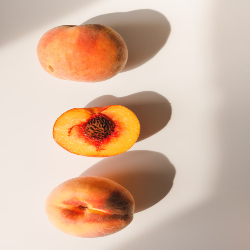Lemon Nutrition facts
Lemon

Juicy, acidic, yet flavorful, lemon is one of the most widely used citrus fruits worldwide. Lime, a close relative, is comparatively smaller and possesses thinner skin.
Botanically, this citrus fruit belongs to the family of Rutaceae, in the genus, Citrus (which also includes orange, pomelo, tangerine, and grapefruit).
Scientific name: Citrus limon. Lemon and limes are small-sized citrus fruits. Nevertheless, both hold much more health-benefiting constituents than other larger citrus family fruits such as oranges, yuzu, pomelo (Citrus maxima), etc.
Similar Food
-
 Acai berry 63 Cal
Acai berry 63 Cal -
 Acerola cherry 32 Cal
Acerola cherry 32 Cal -
 Apple 52 Cal
Apple 52 Cal -
 Apricot 48 Cal
Apricot 48 Cal -
 Avocado 160 Cal
Avocado 160 Cal
Source of Calorie
29
Calories
-
Carbs9.32 g 84%
-
Protein1.10 g 10%
-
Fat0.30 g 6%
How long to burn off 29 Calories?
*Approximate base minutes for a 25-year-old, 65 kg adult at moderate intensity.
Swimming
5
min
Jogging
4
min
Cycling
4
min
Walking
7
min
| Nutrition Principle | Nutrition Value | Percentage of RDA |
|---|---|---|
| Principle | ||
| Energy | 29 Kcal | 1.5% |
| Carbohydrates | 9.32 g | 7% |
| Protein | 1.10 g | 2% |
| Total Fat | 0.30 g | 1% |
| Cholesterol | 0 mg | 0% |
| Dietary Fiber | 2.80 g | 7% |
| Vitamins | ||
| Folates | 11 µg | 3% |
| Niacin | 0.100 mg | 1% |
| Pantothenic acid | 0.190 mg | 4% |
| Pyridoxine | 0.080 mg | 6% |
| Riboflavin | 0.020 mg | 1.5% |
| Thiamin | 0.040 mg | 3.5% |
| Vitamin C | 53 mg | 88% |
| Vitamin A | 22 IU | 1% |
| Vitamin E | 0.15 mg | 1% |
| Vitamin K | 0 µg | 0% |
| Electrolytes | ||
| Sodium | 2 mg | 0% |
| Potassium | 138 mg | 3% |
| Minerals | ||
| Calcium | 26 mg | 3% |
| Copper | 37 µg | 4% |
| Iron | 0.60 mg | 7.5% |
| Magnesium | 8 mg | 2% |
| Manganese | 0.030 mg | 1% |
| Zinc | 0.06 mg | 0.5% |
| Phyto-nutrients | ||
| Carotene-ß | 3 µg | -- |
| Carotene-α | 1 µg | -- |
| Crypto-xanthin-ß | 20 µg | -- |
| Lutein-zeaxanthin | 11 µg | -- |
| Lycopene | 0 µg | -- |